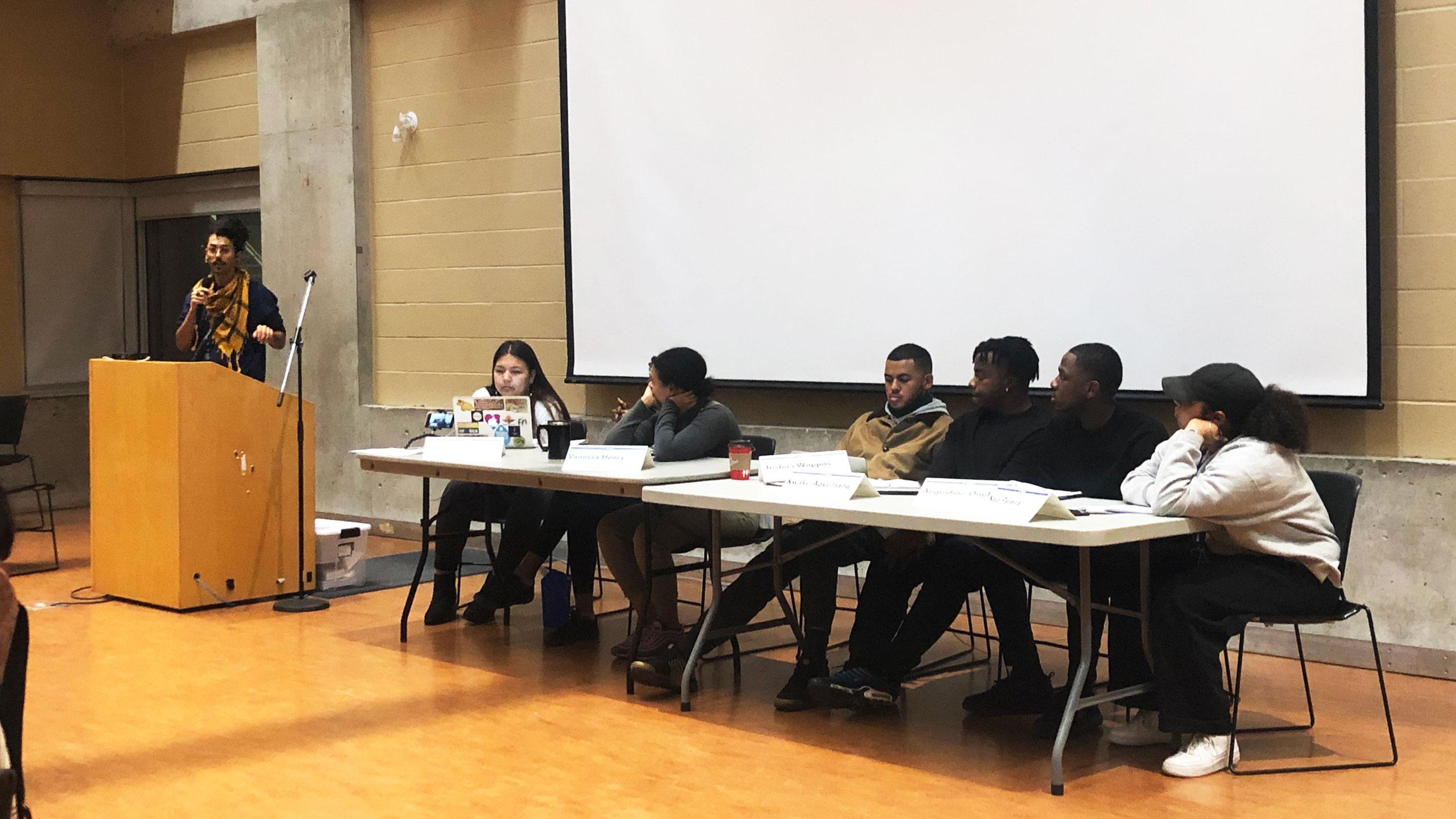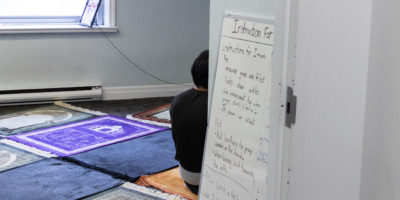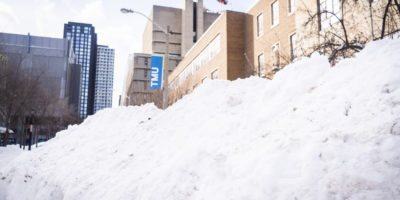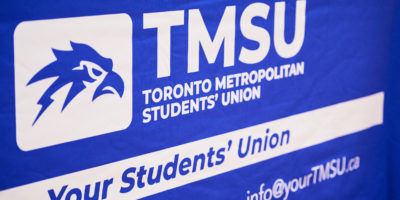By Madi Wong and Valerie Dittrich
A motion requiring the Ryerson Students’ Union (RSU) to “publicly” support a one-day student strike—campaigned for by Ryerson Student Strike (RSS)—failed to pass at a Board of Directors (BoD) meeting on Tuesday.
The strike, which is set to take place on Nov. 6, will protest “Doug Ford’s cuts to [the Ontario Student Assistance Program (OSAP)], cuts to university funding, and attacks on student organizing,” according to the RSS Facebook page.
Previously, the RSU passed a motion during their April annual general meeting (AGM) for a campus strike against the provincial government’s cuts. The motion required the RSU to call on the Canadian Federation of Students-Ontario to organize a one-day student strike in September, as well as to organize their own one-day strike at Ryerson.
James Fotak, student groups director on the BoD, put forward the motion at the Oct. 22 meeting but gave Hermes Azam—former president of Socialist Fightback and current spokesperson for the RSS—his speaking rights multiple times.
“With the help of [Fotak]…We have submitted a motion to today’s Board of Directors meeting to hold the Executive accountable to its membership and to acknowledge the strike votes,” said RSS in a Facebook post on Tuesday.
If the motion was passed, the RSU would “publicly support” the Nov. 6 strike at Ryerson, and encourage all students to participate by email and regular promotion on social media.
But the RSU, as well as the Continuing Education Students’ Association of Ryerson (CESAR), have previously and repeatedly cited concerns around the accessibility of a student strike.
VP education Kwaku Agyemang said that he had concerns with how accessible the RSS general assembly was for students.
“There wasn’t clear communication on what supporting the strike would look like,” said vice-president of marketing, Victoria Anderson-Gardner. “A lot of the spaces I’ve been in with the Socialist Fightback group, I have not felt safe, and I want to make sure everyone from different identities feel safe.”
Additionally, if the motion was passed, the RSU would have to request that the Ryerson Faculty Association (RFA), CUPE 3904, Canadian Federation of Students and other campus unions or associations offer public support, and not cross picket lines; demand the university grant students clemency for missing class, and provide “financial and material support for the strike.”
“I can’t think of any motions at the RSU we had to vote [on] twice,” said Fotak. “This is a case of something got passed at the AGM, and we as a board kind of failed to implement it and let a student group pick it up and do our jobs for us.”
Azam told The Eyeopener that he was disappointed at the outcome, saying the BoD’s decision was a “vote against their own democratic process and a vote against accountability for the [RSU].”
Accessibility issues of campus strike
As previously reported in January, the provincial government announced that they would revert the OSAP program back to the 2016-17 framework, then cut the program by $670 million.
During the meeting, Azam cited a March 20 province-wide walkout to protest tuition changes and cuts to the Ontario Student Assistance Program (OSAP). The Ryerson-based walkout was one of the largest student walkouts in the province.
The motion also requested that the RSU “publicly acknowledge, respect and adhere to the votes taken” during the RSS’ general assembly on Sept. 25.
Since the assembly, the RSU has released a survey to ask students what a strike or day of action would look like for them. According to Agyemang, the union extended the deadline of the survey from Oct. 23 to Oct. 25.
Agyemang said he was concerned about how the RSS could verify that everyone who voted at the general assembly was a Ryerson student.
Hung Le, Faculty of Communications and Design (FCAD) director raised the same concern.
“Can you accurately and confidently tell me that the people in that crowd were all Ryerson students?” asked Le to Azam.
In response, Azam said that the attendees were not all Ryerson students. “We had support from the labour movement, NDP MPP Chris Glover, we had graduate students, campus workers, the fact is that…The majority of the crowd was students and out of that crowd one person voted against it,” he said. It is unclear whether the majority was, in fact, Ryerson students.
‘If we don’t have clemency, it’s actually a dangerous thing to propose’: Azam
According to Azam, RSS has received support from the RFA, who they are working “actively” with. “They were all very supportive and very excited about this campaign,” he said.
In the coming weeks, RSS is focused on getting the university to grant students clemency from missing class, he said.
Ryerson president Mohamed Lachemi previously said that he “always reminds” students that universities are a place of learning, and students are required to attend classes and labs.
At the BoD meeting, RSU president Vanessa Henry asked Azam if “not crossing picket lines” meant blocking students from entering class and raised concerns of students who may have to go to class due to deadlines and midterms.
“If we don’t have clemency, it’s actually a dangerous thing to propose…To have a hard picket,” Azam said.
After a roll-call vote, the motion did not pass.
Three board members voted in favour of the motion, and four voted against it—including vice president of operations Augstine Onuh and vice-president of student life and events Joshua Wiggins.
The rest of the directors and RSU executives present at the meeting abstained from voting on the motion.
In an interview following the BoD meeting, Agyemang said the executives were working directly with RSS, along with CESAR. “Anytime we would make progress…[RSS] would derail on their end.”
During a sit-in in front of the RSU office, Agyemang and CESAR president Nicole Briyiannas explained that they were releasing a survey to all Ryerson students.
Agyemang said that through conversations he had with the RSS, they seemed to understand the survey concept a little better—but they still put forward the motion.
He added he didn’t see the point in the motion, as the RSU was already doing similar work such as the survey.
“We’re working with We The Students RU, CJRU, CESAR, CUPE 3904,” he said. We have to make sure everyone is on board and in solidarity.”
Agyemang said the RSU will continue to reach out to Fightback and RSS about working with the RSU, but that if they decide to do something on their own, they can’t stop them. “I’m more focused on organizing this in terms of how students feel safe to take action and are engaged, as opposed to people striking against each other.”
Azam told The Eye that they had ongoing conversations with the RSU about supporting the strike initiative and that the RSU had drafted a “joint proposal” with CESAR they planned to present at the general assembly, but said the unions backed out two days before.
“That was quite disheartening…It was unfortunate they weren’t there and we have to be honest with students and tell them [during the general assembly] that the RSU wasn’t planning on engaging with their students.”
Azam added that they would still like to “collaborate with whatever the student union puts forward,” but are pushing for a strike rather than a day of action on Nov. 6.
Here’s what else you missed at the BoD meeting.
Director resigns from position, says executive director
Taha Hashemi, Faculty of Engineering, Architecture and Science director, resigned from his position, said the RSU’s executive director Reanna Maharaj.
According to Maharaj, someone else on the board filed a harassment complaint against the former director.
“This is something that was filed quite a while ago but due to hiring and firing in the RSU, we only got around to it now,” she said.
Hashemi told The Eyeopener he did not resign due to the complaint, but because he received a promotion at work, citing that work and school were something he would rather commit to than a volunteer position at the BoD.
Hashemi did not directly comment on the harassment complaint itself but said it was not in relation to his resignation.
Motion to reduce equipment cage fees in FCAD—PASSED
At the beginning of the meeting, Le put forward a motion for the RSU to being or prepare to lobby the Andy Kufluk Equipment Distribution Centre (EDC) and IMA Cage for more “lax fees [and] equipment guidelines.”
“The issue at hand is the fees in regards to being late or losing equipment,” he said. “Most of the time…These circumstances are out of control.”
The EDC late fees incur every half hour by $10, with an extra $10 immediately after it is late.
According to Le, a fine on a students’ account can prevent them from renting more equipment in the future and from getting grades back. It can also prevent them from graduating if they do not pay their fee.
Agyemang also argued for the motion to pass, citing that the fees are “real money” for students, and can be used for groceries and living expenses.
“There is no system in place for accidents,” he said. “There’s no appeals process in place…What is being done with that money?”
Motion to implement monthly town hall meetings for each faculty—TABLED
Put forward by Anasofia Heilbron, Faculty of Ted Rogers School of Management director, this motion would create a place for students to attend to discuss any issues or questions they may have with the RSU. Each town hall would have one BoD member present and one executive present and would be no more than an hour and a half long.
Due to Heilbron not being present to amend the motion, the board decided to table it.
Motion to fix error category error in RSU budget—PASSED
Moved by Henry, this motion stated that the RSU’s financial controller found a “categorization error” in the union’s 2019-20 budget.
The motion will allow for new financial controller Priya Paul to amend that error.
The RSU meeting ended after an in-camera session on the forensic audit—which will examine alleged misspending by past RSU executives.
The next BoD meeting is scheduled for Wed. Nov. 27 from 6 p.m. to 9 p.m. in the Tecumseh Auditorium.












Leave a Reply